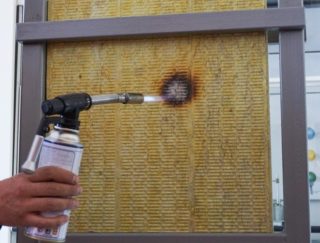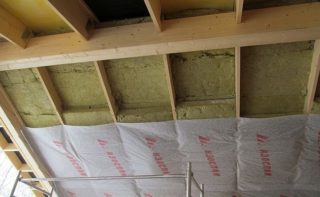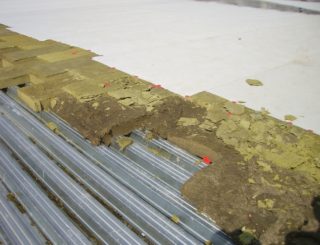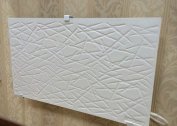Minvata of domestic or imported production is used in the construction of buildings, in the production of buses, trains, boats, cotton wool to warm baths and much more. Mineral wool and basalt are classified as building insulation obtained from inorganic substances. But in everyday life, mineral usually means glass wool.
Features of basalt wool
Basalt is one of the hardest stones; monuments were made from it in ancient Egypt. The most common basalt product in construction is cotton wool. Its production at first glance is a complex process. To obtain it, molten stone splits into long and thin fibers under the influence of high temperature.
The substance has a porous structure, saturated with oxygen, non-combustible, vapor permeable, but low hygroscopic - almost does not absorb moisture. Basalt mineral wool is easy to cut, but retains its shape and withstands small loads. This leads to its widespread use. It is indispensable for the installation of ventilated facades. Being year-round under the influence of cold, moisture, snow, negative or elevated temperatures, the insulation does not collapse and performs its heat-saving function. However, it is not covered by membranes and films.
Basalt wool is used in building structures in almost all areas outside and indoors. Due to the low hygroscopicity, it is beneficial for her to insulate baths, saunas. It is mounted on ventilated facades, as part of a sandwich panel. Involved in the insulation of pipelines operating in various conditions - from -120 degrees to +700 degrees Celsius. Due to fire resistance and lightness, the material is used to isolate structures from heating elements - chimneys of stoves and fireplaces, separating the furnace from the main masonry.
Advantages and disadvantages of basalt wool insulation
This material has more pros than cons. This is due to the properties of the source material - basalt is one of the hardest stones that is difficult to process. In the form of cotton wool, it retains its properties. Dust emits much less than glass wool, due to more durable fibers. Advantages of the material:
- Low thermal conductivity - a layer of cotton wool with a thickness of 10 cm in terms of heat saving is similar to 160 cm of a brick wall.
- Fire resistance - withstands direct fire, temperatures above 1100 degrees Celsius.
- Light weight in comparison with other heaters, for example, expanded clay - it is easy to lift a plate independently, without the help of equipment.
- Convenient installation - the material can even be attached to the ceiling.
- Does not support the growth of bacteria, fungi, insects.
- It is not damaged by rodents.
- Suitable for insulation of floors, walls, ceilings.
- Environmental friendliness - does not emit harmful substances.
- Chemically resistant - does not react with acids and alkalis, solvents.
- Easily mounted with your own hands in the attic, in the apartment, office.
- It does not corrode even in contact with metal.
- Excellent sound absorption and sound insulation.
Despite the wide range of applications, fire resistance, sound insulation, basalt wool has its drawbacks:
- High price.
- Less durable than polystyrene foam.
- It is vapor permeable, therefore it accumulates moisture over time.
- When cutting and laying emits a small amount of dust, so it is necessary to use a respirator.
Mineral slab for insulation compared to cotton is more rigid. Minvata can be dispensed in bags or in bulk. According to the characteristics, they are the same, but if you need to insulate the wall, a stove is preferable for laying.
Basalt-based cotton wool is similar in many respects to other heat insulators made from inorganic materials. But it will differ from similar materials in the following aspects:
- Mounting is easier than glass wool. Fiberglass has to be laid in a respirator, a tight suit, since the fibers can get into the respiratory tract, on the skin, and cause irritation. When working with a basalt analogue, such measures are not needed.
- Basalt wool can withstand heating up to 1100 degrees, when heated to 700 degrees, it does not change its properties for a long time, and glass wool at 300 degrees begins to change its structure.
- The heater is more environmentally friendly, it emits less harmful substances.
- The cost is higher than that of glass analogues.
Features of mineral wool
This category of building materials includes: slag, obtained from waste from the metallurgical industry, glass wool from molten silica sand and stone wool, including basalt. All of these species are fire resistant; several hundred degrees are needed to ignite them. For comparison, the popular insulation foam polystyrene already smolders at 85 degrees. Vats have excellent sound insulation. Stone wool least absorbs moisture, while glass wool requires moisture insulation, otherwise, having absorbed water, it almost completely loses its heat-insulating properties.
Minvats are good heat insulators; they are used in various parts of building structures and vehicles, including ships. They are easily processed, have a low density and light weight, so they are convenient for transportation. A small layer of such insulation in its thermal insulation characteristics (but not strength) is similar to a brick wall.
Stone wool, subject to the technological process, is not harmful to health. Glass wool is often used in industrial buildings, as it is more harmful. Its fibers break easily, getting into the respiratory tract or on the skin, cause irritation.
Which material is better
Which type to choose depends on the specific task assigned to the insulation. Glass wool is cheap, but crumbles heavily, causes allergies, so it is not used in residential premises. During the construction of business centers in Moscow and other cities, mineral wool is used to warm facades, walls and other structural elements. Builders choose basalt thermal insulation as more resistant to weather conditions.
The main difference between basalt mineral wool is its structure of short and thick fibers, which makes the material more resistant to stress. Due to the low absorption of moisture, it is suitable for rooms with high humidity - showers, saunas, baths. Despite the presence of phenol in the composition, it is considered environmentally friendly, therefore it is used in residential premises and offices for wall insulation, soundproofing of partitions, and roof insulation.
Basalt cotton wool has greater mechanical strength, does not crumble. It is preferable to use it for doors as the most durable, resistant to dynamic loads. Other types of mineral wool are similar in other fire safety, sound and heat insulation characteristics.








